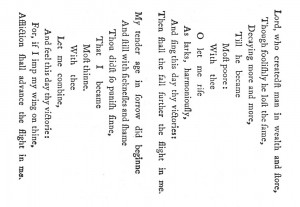They said to each other, “Were not our hearts burning within us while he was talking to us on the road, while he was opening the scriptures to us?”… Then they told what had happened on the road, and how he had been made known to them in the breaking of the bread.
Jesus’ work as Prophet, Priest and King is now continued on the earth by the power of the Holy Spirit in Christ’s Body, the Church. The Church is to proclaim the Gospel of the Prophet, She is a royal priesthood under the High Priest of Jesus and She is an Ambassador for Christ, Citizens of the Kingdom of God. The ministry of all the Baptized is the continuation of these offices as Christ’s Body to the World, so we pray in the Great Thanksgiving, “As this bread is Christ’s body for us, may we be Christ’s body to the world.” (Great Thanksgiving from the Book of Common Worship) As those charged with the prophetic task of proclaiming the Gospel, we share the story of Christ to the World and preach the mystery to the powers and principalities. As a royal priesthood we continually offer our sacrifice of praise and thanksgiving. We intercede for the world around us. We remind the world of God’s Law. As servants of the King we live a life of obedience that is different from those around us. We work to build the imminent Kingdom of the prince of peace by doing the work Christ did, teaching, healing and serving. We walk in this life through prayer, scripture reading and corporate worship.
In addition to the ministry of all the Baptized, the Church is given the gift of leaders for her well being. Although the church has ordered Her ministry differently in various traditions, the basic ministry, roughly parallel to prophet, priest and king, is that of Word, Sacrament and Order.
Ministers are entrusted to guard the Revelation that was preached by the Apostles and handed down through the ages. Ministers are to proclaim the Gospel message in a way that is relevant to each age, though without adding to or taking away from the Words of Life. Ministers also administer the sacraments to God’s people. They distribute the gifts of God to His people in His name. Additionally, so that all things may be done “decently and in order,” the Church is given officers who keep order and discipline within the bounds of the community. The tasks of ministry are not merely human endeavors, for in proclaiming the gospel, in celebrating the sacraments and exercising the power of the keys it is Christ Himself who is ministering. Christ Himself speaks to the Church, is present in the covenant signs and in the decisions of rule. “Whoever speaks must do so as one speaking the very words of God.” (I Peter 4:11) “The cup of blessing that we bless, is it not a sharing in the blood of Christ? The bread that we break, is it not a sharing in the body of Christ?” (I Corinthians 10:16) And in Matthew 18, Jesus teaches on Church discipline with the promise that “For where two or three are gathered together in My name, I am there in the midst of them.”
The Church’s foundational service to God is regular corporate worship on the Lord’s Day. In this gathering we again meet the risen Christ on our way, He shares again with us Scripture and is seen in the breaking of bread. The Church is wherever the presence of Christ is. It is the Living Word spoken by the Father and empowered by the Spirit that calls the Church into existence. “Wherever we see the word of God sincerely preached and heard, wherever we see the sacraments administered according to the institution of Christ”, in other words, we find the Church when Emmaus is relived. (Calvin’s Institutes, 4.1.9)
The Lord’s Supper is the defining aspect of Christian worship. Although the table is never separated from the pulpit, the acts of Taking, Blessing, Breaking and Giving order the Church’s Liturgy and gives shape to Her whole life. In the Eucharist we render our sacrifice of praise and thanksgiving, “Therefore by Him let us continually offer the sacrifice of praise to God, that is, the fruit of our lips, giving thanks to His name.” (Hebrews 13:15) In the Feast of Holy Communion we are united with the Christ who is truly present and all who are baptized in His name. At the Lord’s Supper we “do this in remembrance of the Lord” who paid the sacrifice for us and called us into Covenant. This sacred meal brings time into eternity, we look back in remembrance of the Lord’s earthly life, and we share union with Christ in the present and look forward to the future “when we shall feast with Him in glory.” (Great Thanksgiving from the Book of Common Worship)
This brings us back to Advent when we remember and long for our coming Savior. The Christian life is about what Christ has done and continues to do in and through us. Christ continually forms us through the gifts of the Church. He calls us deeper into union with Him through His Covenant. As we are gathered into Christ, we are taken into the whole of the Holy Trinity. The part we play is small. It is not passive, it is prayer, hope, rest, study, eat, and work. But it is God the Father, Son and Holy Spirit who creates, redeems and sanctifies us. We are brought into this Life simply by receiving this amazing Grace through an active faith, which itself is a gracious gift from the One who saves.

